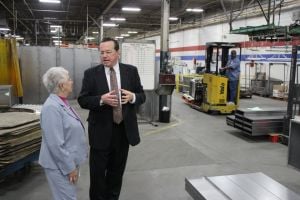News Home
Foxx visits Kewaunee, seeks input
Washington, D.C.,
August 20, 2013
U.S. Rep. Virginia Foxx paid a visit to Kewaunee Scientific on Tuesday to tour the facility and hear from her constituents on the laboratory furniture manufacturer’s management team.
Foxx visits Kewaunee, seeks inputBy John Hamlin
U.S. Rep. Virginia Foxx paid a visit to Kewaunee Scientific on Tuesday to tour the facility and hear from her constituents on the laboratory furniture manufacturer’s management team. Foxx paused to shake hands with workers as she toured the 325,000-square-foot factory floor, which grew through decades of expansion from a wood plant built in 1955 to become the company’s complete consolidated manufacturing location and headquarters in the 1980s. Spurred by 13.9 percent revenue growth for the fiscal year that ended April 30, Kewaunee has continued to invest in its Statesville location and proudly showed off several recently purchased major pieces of equipment. “We moved offices to other parts of the building because we’re having to reclaim factory floor space to accommodate the growth that our business is showing,” said Dana Dahlgren, vice president of sales and marketing. Following her tour, Foxx spent 45 minutes addressing questions and concerns from the Kewaunee management team in a conference room, where she discussed worries about the National Labor Relations Board, the failure of American schools to produce skilled laborers, the implementation of Obamacare and tax code reform. In what Foxx called a perfect example of why she meets with companies in her district, the congresswoman learned that Kewaunee had suffered from an anti-dumping duty placed on imports of Chinese plywood, set on April 30 by the U.S. Commerce Department. “Did the U.S. manufacturers say, ‘Yay! Now we’re going to get the business?’ No, they raised their prices by 35 percent,” said Kurt Rindoks, vice president of engineering and product development. “We have to compete against manufacturers out of Canada and Mexico that can still buy from these sources, and that puts us at a competitive disadvantage. We need to buy materials from where we can anywhere in the world because we’re competing on a global basis.” The dedication of congressional members to visit their districts and learn how federal legislation affects their lives, often in unforeseen and unintended ways, is a major reason Foxx said it concerns her to watch the Obama Administration increasingly maneuver around the legislative branch. “The founders intended for the House, in particular, and the Congress to be the most powerful part of our government because we’re the most responsive to the people,” Foxx said. “Members of Congress, at least on our side of the aisle, are all out there listening to folks like you, what your concerns are, and then we take those back and try to act upon them. It isn’t the executive branch’s responsibility to pass laws; the executive branch is to implement the laws passed by the Congress.” |

